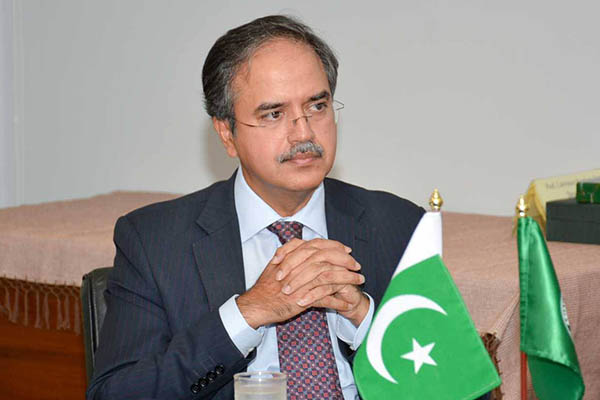
File photo of Foreign Office spokesperson Asim Iftikhar
In weekly press briefing, Foreign Office spokesperson reiterates resolve to keep apprising international community of India’s human rights violations
Pakistan on Thursday reiterated that regular engagement with the U.S. was necessary for stability in the South Asian region, adding that this was “mutually beneficial” for both states.
“We look forward to reinforcing a balanced Pak-U.S. relationship that is anchored in mutually beneficial cooperation in all areas including security, trade, investment, energy and regional connectivity,” Foreign Office spokesperson Asim Iftikhar told a weekly press briefing.
Ties between Pakistan and the U.S. have been strained since President Joe Biden assumed office earlier this year, with officials in Islamabad often complaining that the American leader has yet to have any direct contact with Prime Minister Imran Khan unlike past practice. Engagement between the two states, however, has continued at lower levels, which observers say is necessary for Washington to maintain its interests in Afghanistan.
Pakistan’s alleged role in the Taliban’s takeover of Kabul on Aug. 15 has also proven a sticking point, with Washington attempting to scapegoat Islamabad for its failures in the war-torn state during the 20 years its forces were deployed there.
“There is a desire on the part of Pakistan, and I believe on part of U.S. as well, to make this relationship broad-based and forward looking, moving away from looking at it mostly from the perspective of Afghanistan,” Iftikhar said. Referring to legislation proposed by 22 Republican senators that has called for sanctions against the Taliban and their “foreign” backers, he stressed that while this was a matter of concern, it did not “necessarily reflect the United States’ official position” and was “inconsistent” with the reality of the ongoing cooperation between Pakistan and the U.S. on Afghanistan.
Reiterating that Pakistan and the U.S. had many shared interests, the spokesperson said U.S. Deputy Secretary of State Wendy Sherman’s visit to Islamabad would include discussions on matters of mutual interest, including bilateral relations and the prevailing regional situation. In addition to meeting Foreign Minister Shah Mahmood Qureshi, Sherman is also scheduled to meet Army Chief Gen. Qamar Bajwa and Prime Minister Imran Khan.
Human rights in India
During his briefing, the spokesperson also reiterated Pakistan’s resolve to continue to apprise the international community about the deteriorating situation of human rights of minorities in India. “We are extremely concerned about the rapidly deteriorating situation of human rights and rights of minorities in India. Not only Muslims but also Dalits, Christians and other minorities in India live in an environment of perpetual fear and intimidation,” he said, citing an incident on Oct. 3 in which a mob of hardline Hindu extremists had ransacked and vandalized a Christian prayer house in Uttarkhand province.
Similarly, he said, Muslims continued to be harassed with impunity across India, adding that an eviction drive in Assam had rendered thousands of Muslims homeless. “Recent incidents of demolition of the ancient Bilal mosque in Haryana and Masjid Ghareeb Nawaz in Uttar Pradesh are glaring examples of Indian state complicity in the acts of repression against Muslims,” he said.
“Beneath the veneer of democracy, the reality of today’s India is morbid. The world must arrest India’s open and remorseless transgressions before it is too late,” he said, adding that “brutality, state-terrorism, war crimes and systematic violations of human rights” continued unabated in India-held Kashmir, which was very concerning.
On last month’s address of Prime Minister Imran Khan to the U.N. General Assembly, Iftikhar said he had shared Pakistan’s perspective on the developments in Afghanistan; Islamabad’s immense sacrifice and losses during the war on terror; its constructive role and sincere advice throughout; and the imperative of engaging with Afghanistan to ensure durable peace in the war-torn state.
